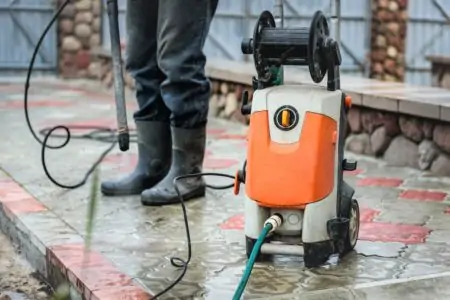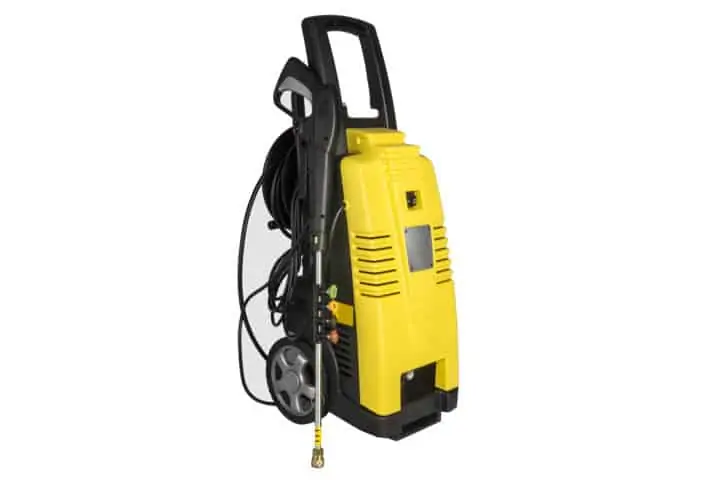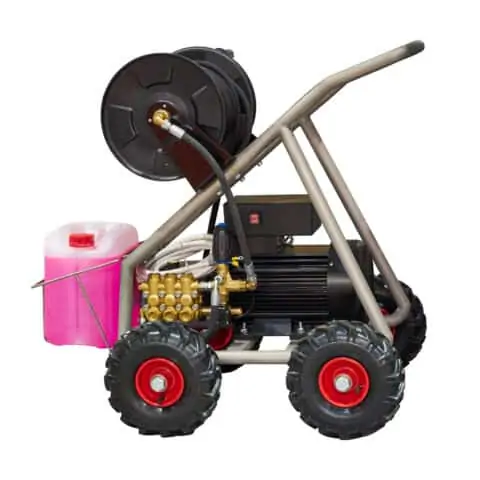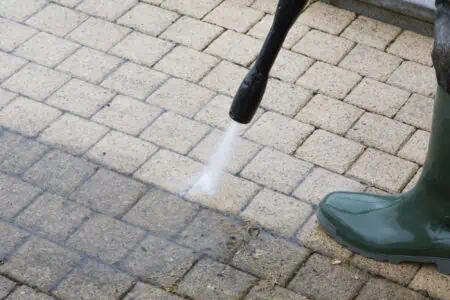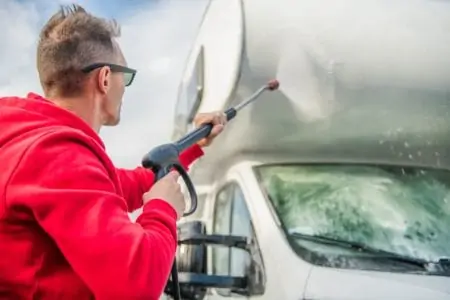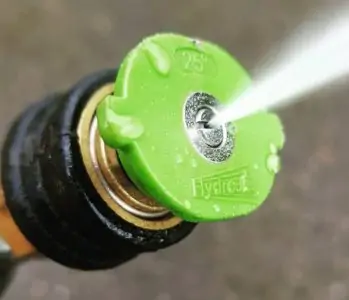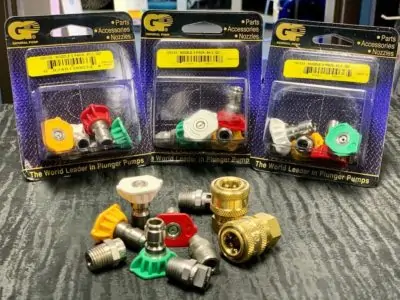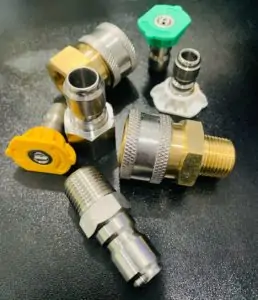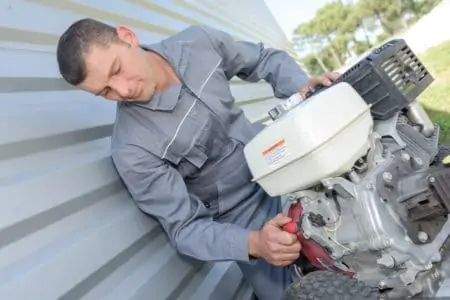The world of pressure washers can be a bit confusing. But a good place to start is to look at the differences between an electric vs gas pressure washer.
In this post, we’ll discuss the big differences, the pros, and cons of each, as well as determining which is best for you. We’re here to take the pressure off choosing your pressure washer.
Key Takeaways
- Electric pressure washers are ideal for home use, while gas pressure washers are better for heavy-duty tasks and commercial jobs.
- Electric washers are more eco-friendly, budget-friendly, and convenient, but have less power and durability.
- Gas pressure washers have higher PSI, are more durable and powerful, but are more expensive and have running costs.
- Choose electric pressure washers for tasks like car detailing and siding cleaning, and gas pressure washers for concrete, job sites, and paint prep areas.
What’s the Difference Between Electric vs Gas Pressure Washers?
There are a few big differences. Let’s break it down for you!
How It’s Powered
The big difference is how it’s powered.
An electric pressure washer is powered into an electric source, such as an outlet, or is run on a battery.
A gas pressure washer, on the other hand, runs on fuel.
Bonus Tip
Pressure Amount
Another noticeable difference is the pressure that comes with either type. Pressure is measured in something called PSI — pound per square inch. The higher this number, the greater the pressure.
Electric pressure washers are usually between about 500 and 2000 PSI, and therefore are better for light-duty cleaning.
Gas pressure washers usually have a minimum PSI of about 2500, but most are between 3000 and 4000. This a lot of power, allowing gas pressure washers to tackle heavy-duty tasks.
Cost
Cost is a deciding factor for many people, as electric pressure washers are quite a bit more budget-friendly than gas ones. However, gas pressure washers may last longer, so some see this as a worthwhile investment.
Durability
On the back of our previous point, durability is a big difference between these two types. Gas pressure washers will typically last longer since the metal pumps and components are replaceable and easy to maintain.
Electric pressure washers are much more difficult to repair. Therefore, they just don’t last as long.
Electric vs Gas Pressure Washers: Pros and Cons
Now that you know the main differences, let’s delve into the specific pros and cons in a bit more detail. This will help you know exactly what to expect from each type.
Electric Pressure Washer
Pros
What are the main advantages of having an electric pressure washer?
- Great for home use: You’ll love having an electric pressure washer for home use. It’s great for cleaning your decking, patio, siding, and cars. The amount of pressure is usually enough to do a good clean without causing any damage.
- Convenient: Electric pressure washers have convenience about them over gas ones. They’re usually much more lightweight, making them simple to maneuver. They’re also compact which allows them to be stored easily. Last but not least, they are pretty quiet.
- More eco-friendly: Electric products are always more eco-friendly than gas ones, as there are no fuel or gasoline emissions polluting the environment. This keeps your work area healthy for you, your family, and your pets.
- Affordable: These are more affordable than gas pressure washers. You can find quality options for less than $100, which is great if you’re on a budget.
- No hidden costs: When you buy your electric pressure washer, you’re done paying the money. You don’t need to buy fuel or oil to keep it running. Just plug it in and you’re good to go!
Cons
There are some disadvantages to electric pressure washers that you should also know about.
- Less power than gas: This is one of the major drawbacks of electric pressure washers. They just don’t have the same force behind them. So you may find yourself struggling to blast away super heavy-duty stains or dirt on surfaces.
- Not as durable: While they are cheaper, that comes with its own price — these pressure washers are not as durable. This is down to the materials, for starters, as electric pressure washers use many more plastic elements than metal in both the body and the nozzles. In general, they just don’t have the same lifespan as gas ones.
- You need to be near an outlet: Because you need to hook up to a power source, that limits you to stay near an outlet. This can put a damper on your flexibility.
Gas Pressure Washer
Pros
Now that we know what to expect from an electric pressure washer, let’s look at some of the major advantages of choosing gas.
- Ultimate power: With gas pressure washers, you’re getting peak power performance. They often go up to 4000 PSI, meaning that you can get a wild amount of pressure. This allows for heavy-duty cleaning, and it’s great for commercial tasks as well as domestic.
- You may not need detergent: Because of the high water pressure, you may be able to cut down on detergent where possible. This can save you money, but it also eliminates the need for harsh chemicals from time to time.
- You save time: Because of the power, you can clean surfaces up to three times quicker than you can with electric pressure washers. So if you have a business, gas is a great choice as you can do more jobs in a day!
- Uber portable: While gas pressure washers are heavier, they are often in sturdy steel frames with wheels to allow for easy portability. This allows you to maneuver it around the job site with total ease.
- Very durable: When you choose gas, you’re choosing a long-lasting power tool that will be with you for years to come. Despite the high cost, it should work out as being worth it in the long run.
Cons
Now let’s look at some of the main drawbacks, so you know what you’re getting into when you choose gas.
- Heavy and noisy: Gas pressure washers are heavy and even though they’re on wheels, most of the time, they can still be too heavy for some users. Also, they’re noisy, so your neighbors might not appreciate you using this during the weekend!
- They have running costs: Unlike electric pressure washers, gas pressure washers do have running costs. You need to have fuel or oil on hand at all times for the pressure washer to run, which can add up over time, depending on how much you use it.
- A little more dangerous: Due to the fuel, emissions, and the power behind these tools, they’re slightly more dangerous than electric pressure washers. Make sure you know exactly how to use it before getting started to ensure that you’re being as safe as possible.
- Expensive: Another drawback we need to point out is the price. These pressure washers aren’t cheap. If you’re on a budget, you may want to opt for an electric option just to save you some pennies.
Which Type of Pressure Washer Is Best: Gas vs Electric?
Which type is best definitely comes down to what you’re using it for.
For residential and domestic jobs, electric is usually best since the lower PSI is tough but still gentle. You won’t damage your siding, cars, or patios. On that note, electric is definitely recommended for car detailing. However, you can use certain gas models if you opt for a wide nozzle and stand far enough back from the car.
If you’re going to be tackling heavy-duty jobs, or you’re using the pressure washer commercially, then a gas one is probably best for you. Despite the hefty investment price, you should earn it back quickly if this is your job, and you’re choosing something that you can rely on for a long time.
Gas pressure washers are great for concrete (including parking lots and sidewalks), job sites, and paint prep areas. In general, they work for places that attract heavy messes.
FAQs
Battle of the Pressure Washers
And who’s the winner?
Well, it all comes down to personal preference and what you’ll be using it for. It’s hard to choose one over the other when these two types of pressure washers are so different from each other.
The bottom line is electric pressure washers are a great choice for the home, siding, and car detailing. Gas pressure washers are better suited for heavy duty and commercial jobs, such as building sites, concrete, and prepping for paintwork.
